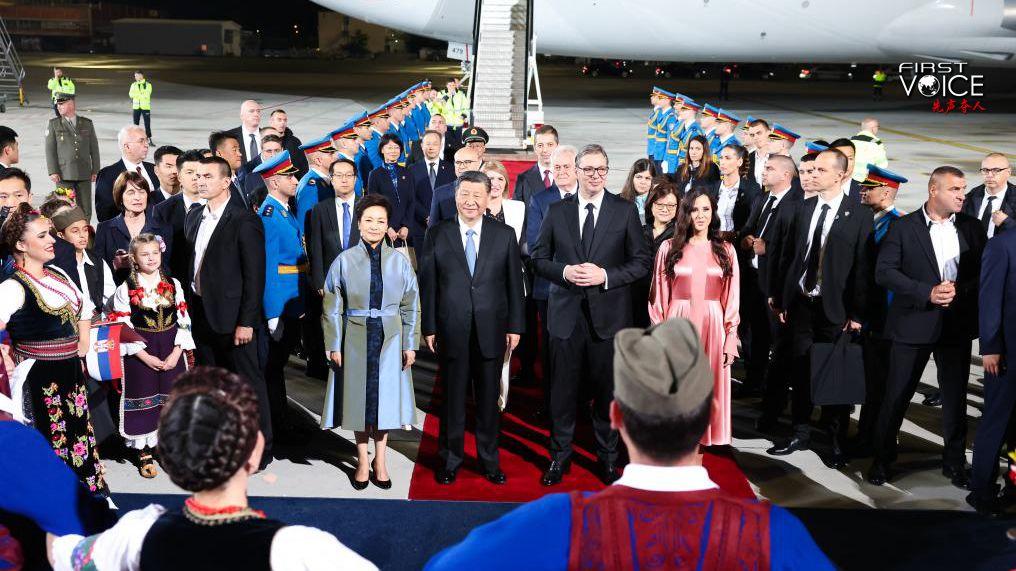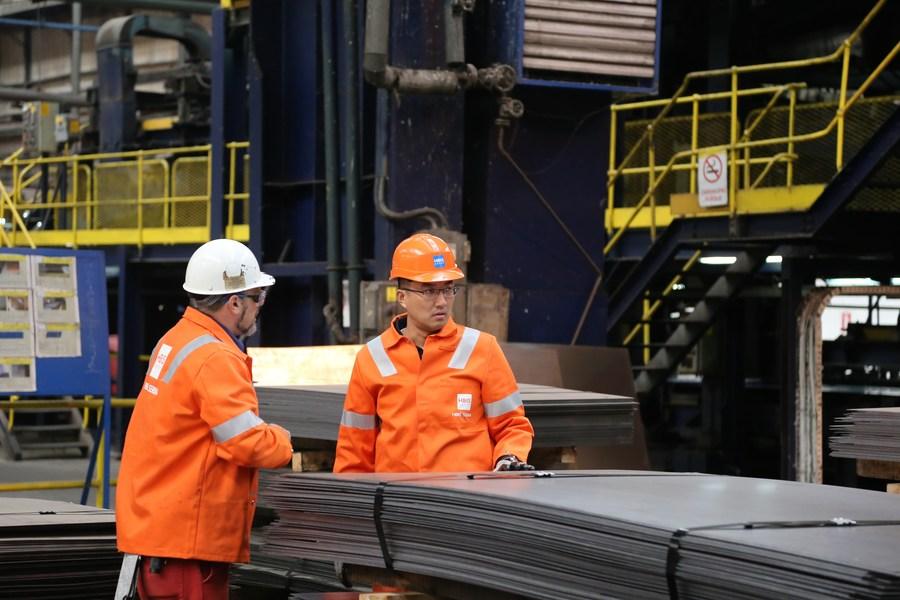
Chinese President Xi Jinping arrives in Belgrade for a state visit to Serbia at the invitation of Serbian President Aleksandar Vučić, May 7, 2024. [Photo/Xinhua]
Editor's note: CGTN's First Voice provides instant commentary on breaking stories. The column clarifies emerging issues and better defines the news agenda, offering a Chinese perspective on the latest global events.
Chinese President Xi Jinping on Wednesday held talks with his Serbian counterpart Aleksandar Vučić in Belgrade on the second leg of his European tour. The two heads of state announced the deepening and upgrading of the China-Serbia comprehensive strategic partnership and the building of a China-Serbia community with a shared future in the new era.
Xi-Vučić meeting is encouraging for Beijing-Belgrade ties. Forged during the bitter Anti-Fascist War, Beijing and Belgrade's mutual support remains as strong as ever as the world is undergoing transformations unseen in a century.
"Our bilateral relationship has stood the test of changing international environment and become a fine example of state-to-state relations," Xi said at Belgrade Nikola Tesla airport as he arrived in Serbia. Xi's Serbia visit falls on the 25th anniversary of NATO's bombing of the Chinese embassy in Yugoslavia, which killed three Chinese journalists. Forged with the blood of the two nations, the China-Serbia friendship, as Xi noted, will inspire the two to march forward with big strides.
Geographically separated by the Eurasian continent, China and Serbia share common interests and have stayed committed to mutual benefits. In 2023, China was Serbia's largest source of foreign investment and its second largest trading partner after the EU. In the meantime, Serbia is China's first free trade partner in Central and Eastern Europe.

A Serbian worker (L) talks with a Chinese engineer at a workshop of HBIS Serbia in Smederevo, Serbia, October 10, 2019. [Photo/Xinhua]
The Beijing-Belgrade economic collaboration has brought a myriad of opportunities to both countries. Take HBIS Smederevo Steel Plant as an example. Established in 1913, the steel mill was hailed as the "pride of Serbia" in its glory days, supplying around 40 percent of Smederevo's fiscal revenue and sustaining nearly a third of its residents. But in the 1990s, it was on the brink of shutting down as a result of poor management.
It was China's investment in 2016 that rescued Serbia's previous pride from the crisis. With investments from China's HBIS Group, the plant has been creating 200 new jobs every year since then and has become a pillar of local economic growth, with one-fifth of the city's population working in the steel industry, according to media reports. The once nearly-bankrupted plant has become one of the three largest export companies in Serbia.
"After taking over the operations, HBIS Group brought new changes to the plant, securing our jobs and livelihoods," Ivan Matkovic, the production manager of the hot rolling workshop at the steel plant, was quoted by People's Daily as saying.
The rebirth of Smederevo's plant stands as an epitome of multi-win China-Serbia cooperation under the Belt and Road Initiative (BRI), which is a never-to-miss opportunity for the two countries seeking for mutual benefits. The Belgrade-Novi Sad railway, for instance, has reduced the travel time between Belgrade and Budapest from eight hours to three after coming into full operation.
Flourishing Beijing-Belgrade cooperation epitomizes the growing synergy between the development strategies of the two countries. While Serbia needs China-invested projects to boost employment and revive its economy, China is striving for its modernization in all respects and moving faster to develop new quality productive forces. In this context, its investments in Serbia will help bolster trade relations and thus more economic opportunities.
At present, the two countries – against certain Western voices that China is dumping polluted capacity on Serbia – are exploring cooperation in green energy, technological innovation, advanced manufacturing, artificial intelligence, the digital economy and other emerging industries. In January this year, Serbia secured $2.18 billion renewable investment commitment from China that includes plans for a wind farm, a solar plant and a hydrogen production facility.
As Xi noted, China-Serbia cooperation – rooted in the principles of equality and mutual benefits – serves the fundamental and long-term interests of both countries and provides strong momentum for their respective development and rejuvenation.
The ironclad friendship between Beijing and Belgrade demonstrates that their stronger bilateral relationship is an essential choice for the interests of two peoples.

 中文
中文



